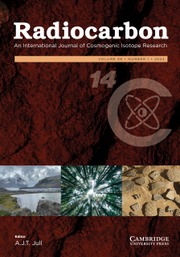Article contents
Assessing the Effect of Sterilization on the Radiocarbon Signature of Freshwater Dissolved Organic Carbon
Published online by Cambridge University Press: 18 July 2016
Abstract
Radiocarbon analysis of freshwater dissolved organic carbon (DOC) involves substantial sample pretreatment, including an initial rotary evaporation stage necessary to concentrate large volumes of freshwater sample. This may lead to a health risk from the exposure to pathogens, and there is the additional concern that the warm conditions during the rotary evaporation stage may provide ideal growing conditions for some pathogens. To remove any pathogen risk in water samples, boiling or autoclaving can be undertaken. However, to date, no studies have been undertaken to investigate whether boiling will alter the 14C signature of dissolved organic carbon. Here, we analyze the effect of sterilization on 9 contrasting river water samples. Comparing filtered, filtered and boiled, and filtered and sterilized dissolved organic matter, we observe that both boiling and autoclaving increases the uncertainty associated with the 14C and 13C of DOC, that the 14C and 13C changes are not unidirectional, and that they are not related to original DOC composition. Neither sterilization method is recommended unless essential, in which instance we recommend a 3σ uncertainty on 14C and that the 13C is not considered representative of the original sample.
Information
- Type
- Articles
- Information
- Copyright
- Copyright © The Arizona Board of Regents on behalf of the University of Arizona
References
- 2
- Cited by

